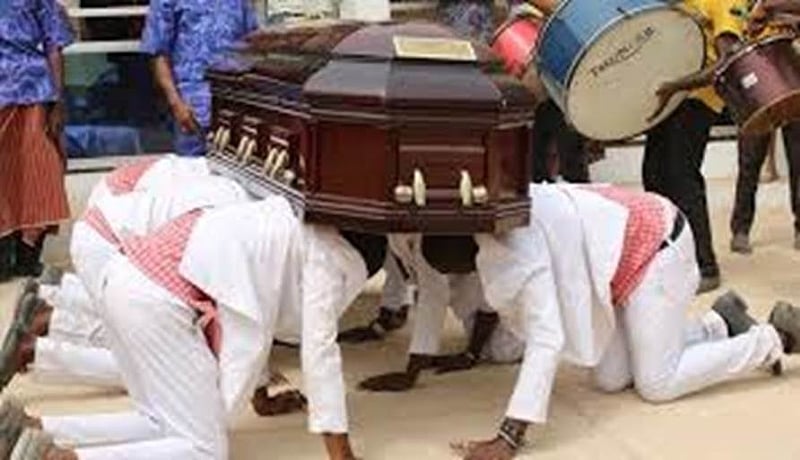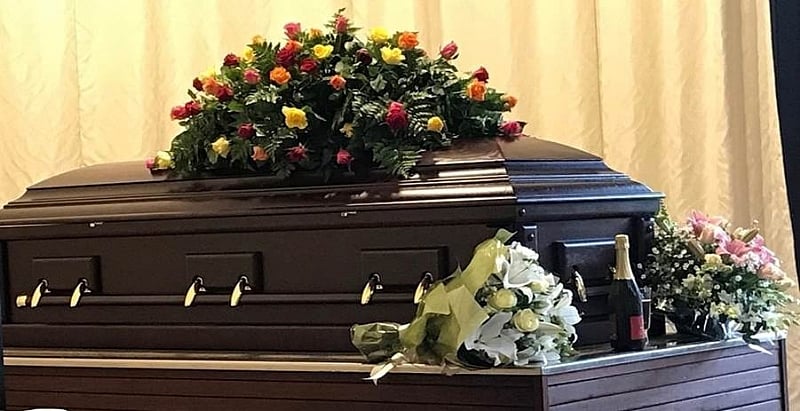In the tradition and culture of the Igbo tribe of Eastern Nigeria, the idea of giving a dead member of the community a “befitting burial” has almost become a sanctimonious possession. In fact, it appears to have become a cultural imperative, deeply rooted in traditional belief systems, the community’s show of solidarity and consequent expression of spiritual symbolism. Yet, this cultural phenomenon is often misunderstood, misinterpreted, and even criticized by antagonists of the very idea, especially the younger generation of Ndigbo who increasingly view it as ostentatious and wasteful. But, if we peel the layers of cultural symbolism, we uncover the essential truth: that “befitting burial” is not for the benefit of the dead, but for that of the living.
Among the Igbo tribe of Eastern Nigeria, there is the belief that physical death is not an end in itself. It is a transition. When a man dies, he enters into the ancestral realm. He joins those who were there before and together they continue to influence the lives and values of the community at the spiritual level. There is a clear understanding that the dead person does not perceive or enjoy the funeral rites in any physical sense. Once people have breathed their last, they go far beyond earthly concerns. The question then is: if the deceased cannot enjoy the beautiful golden casket, the slaughtering of expensive cows, the captivating musical performances and elaborate dances that attend to his burial, why do families insist on expensive funerals in the guise of giving the deceased a befitting burial?
Much as there are valid points in this query, the simple fact is that over the years, burial rituals have become social tools: something like a ladder for the living relatives of the deceased to ascend to greater heights. As funerals have become accepted as platforms for showcasing family strengths, unity, wealth, and status, they have inadvertently become a means to cement the family’s social standing and to create opportunities for alliances, business connections, and community goodwill.
The reality, however, is that when a man dies, the family he left behind normally faces intense community engagement. A poor or low level funeral could be regarded by the community as a sign of poverty, family disunity, and in some extreme cases, even a curse. On the other hand, a grand burial ceremony announces to the world, beyond even the community, that the deceased was loved and honoured, and that he belonged to a family that is united and prosperous. That alone can secure the family’s place in the community hierarchy for generations to come.

But the issue of befitting burial always had its challenges and hiccups. When faced with cases of terminal illnesses, for example, many Igbo families find themselves challenged with making difficult decisions. Although modern medical practice often emphasizes fighting to the end, regardless of the cost or the prognosis, there is sometimes the temptation of discontinuing medical bills in order to conserve enough money to offer the deceased a befitting burial. Some believe that this would be consonant with the Igbo thought that death be accepted as a natural transition to the Great Beyond rather than insensitively regarded as an enemy that has to be defeated at all costs. So, when a family receives informed medical advice indicating that a loved one was unlikely to recover, traditional wisdom would dictate to them to start preparing for the next phase: death and the journey to the ancestral world. Instead of mindlessly pouring money into futile medical interventions, resources are redirected toward preparing a dignified farewell.
Some may view this as giving up too soon, but for the Igbo, it is an act of wisdom and a show of love. Indeed, this has remained the controversial aspect of traditional thinking, the decision to “give up” on medical treatment to save money for the funeral. Critics rightly argue that this can be ethically problematic. Every life is precious, and modern medicine offers many avenues for healing that should not be prematurely abandoned. From the Igbo perspective, especially in cases of terminal illness, there is a belief that forcing life through excessive medical intervention may go against the natural order. It may cause unnecessary pain and rob the dying of dignity. By shifting focus to preparing spiritually and materially for death, families believe they honour the person’s passage and avoid his unnecessary suffering. Moreover, the emotional burden of watching a loved one endure prolonged illness can be unsettling. Accepting death and preparing for it allows families to process grief in stages, making the final transition less traumatic. It spares the dying individual prolonged suffering and saves the family financial hardship. More importantly, it enables the living to fulfill their cultural obligation, which they believe ensures the deceased’s peace and continued influence as a benevolent ancestor. A befitting burial can be likened to a public relations campaign for the family. Guests come from far and near, including influential figures, politicians, business associates, and extended family. During the funeral, the family demonstrates its organizational capability, resourcefulness, and ability to mobilize support. Many families use funerals to announce new family heads, launch philanthropic projects, or strengthen ties with in-laws and neighbouring communities. During these gatherings, new friendships are formed, old grievances are resolved, and future marriages are arranged. Business partnerships can be solidified over shared drinks and meals. In that way, the burial ceremony becomes a social investment whose returns, though intangible in the immediate sense, can be significant in the long run.
In traditional Igbo spirituality, to be forgotten after death is to truly die. A person who is remembered, whose name continues to be on the lips of his people and is mostly remembered with a sense of nostalgia because he still lives in the hearts of the community he left behind, is believed to enjoy a form of continued existence. A grand funeral ensures that the deceased is memorialized and honoured, thereby granting him a form of immortality on this part of the divide. This idea is captured in the saying: to live in the hearts of those we love is not to die. By giving a befitting burial, families believe they are helping the deceased achieve this spiritual continuity. The elaborate ceremonies, prayers, and community celebrations serve as a bridge connecting the living and the dead, ensuring that the deceased is incorporated into the lineage of revered ancestors.
So, in many ways, the befitting funeral is a spiritual transaction as much as it is a social one. The deceased is inducted into the ancestral council, where members can intercede for the family and community, offer protection, and ensure a bountiful harvest. The Igbo rightly or wrongly believe that failure to perform these rites properly could result in family misfortunes attributable to an angry or restless spirit.
Even with rising health care costs and economic challenges, it may seem irrational to spend lavishly on funerals instead of channelling resources into saving a loved one’s life. The perspective might appear callous or even cruel: why not exhaust every possibility to keep the sick alive rather than save up to bury him well? Critics argue that sometimes, spending lavishly on funerals results in family poverty and indebtedness. They point out that some families go into heavy debt to meet societal expectations, jeopardizing their prospects of survival after the expensive funerals. Younger generations, exposed to globalized values and economic pragmatism, often question the wisdom in such expenditures.
Indeed, there is some validity in these criticisms. It is common to see cases where families sell land, borrow heavily, or liquidate businesses to fund elaborate funerals. In extreme cases, such financial stress can lead to family conflicts, mental health challenges, and even further impoverishment. Yet, even in the face of these challenges, the cultural logic seems to remain strong. The social capital gained from a befitting burial appears able to outweigh the immediate financial cost, at least in the community worldview. Moreover, as some elders argue, money spent on a burial is never truly wasted if it strengthens family ties and enhances the family’s standing within the community.
On another level, urbanization, education, and religious transformations are gradually altering burial practices. Many urbanized families now prefer simpler funerals, aligning with Christian doctrines that discourage extravagant spending on the dead. Churches often stress the importance of “living funerals” which is caring for people while they are alive, not honouring them after death. However, even within Christian communities, the desire to “do it well” persists. Funerals continue to attract large crowds, and families still feel the need to provide ample food, drinks, and entertainment. The difference is in the scale and focus: more families now emphasize moderation and charitable giving as part of the funeral ceremonies.

Also, children and grandchildren learn important family values through funeral ceremonies. They witness the importance of communal support, the significance of family honour, and the intricate connections between the living and the ancestors. They learn that wealth and social standing are not only measured by personal success but also by the ability to rally support and uphold traditions. These ceremonies serve as cultural classrooms, transmitting indigenous knowledge and practices to future generations. Music, dance, attire, and ritual performances all reinforce cultural identity and pride.
Ultimately, a befitting burial is not an exercise in vanity or senseless extravagance among the Igbo tribe. It is an intricate social, spiritual, and cultural practice designed for the benefit of the living. It strengthens family bonds, preserves cultural heritage, consolidates social capital, and provides spiritual comfort. Yes, it is true that the dead do not eat the sumptuous meals or admire the fine fabrics. They do not hear the praise-singers or feel the rhythm of the drummers. But in honouring them, the living reaffirm their own humanity and interconnectedness with their ancestors. They find meaning and closure, express grief and gratitude, and reaffirm their place within the larger community. In the end, to live in the hearts of those who love us truly means we never died. Through the ceremony of a befitting burial, families ensure that their loved ones continue to live, not in the flesh, but in memory, in spirit, and in the ongoing story of the family. The burial is a final gift to the deceased but, more importantly, a profound statement to the world that life, love, and community endure beyond the grave.


